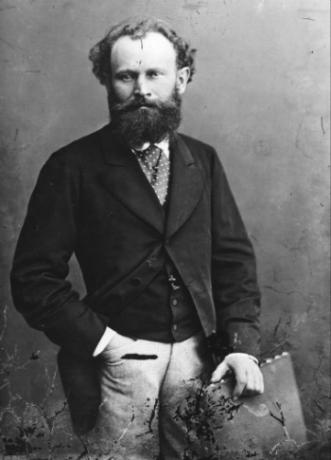Alphonsus of Guimaraens (1870-1921) was one of the most emblematic writers of the Symbolist movement in Brazil.
This literary movement began with the publication of the work Missal and Brockets de Cruz de Souza in 1893 and lasted until the beginning of pre-modernism in 1910.
Biography

Afonso Henrique da Costa Guimarães was born on July 24, 1870, in the city of Ouro Preto, Minas Gerais. Son of a Portuguese merchant and a Brazilian, he completed his primary and secondary studies in his hometown.
He studied law in São Paulo and finished the course in Minas Gerais. During his academic life he already wrote for several newspapers. As a lawyer, Guimaraens worked as a prosecutor and judge in Minas Gerais.
A very painful event for the writer was when Constança, his fiancée and cousin, died prematurely at the age of 17. At the time, he was 18 years old and this fact became predominant in his poetry, which was full of melancholy.
After the event, Alphonsus indulges in bohemian life. Despite this, he married Zenaide de Oliveira in 1897 and had 14 children with her.
Two of them followed in their father's footsteps and became writers: João Alphonsus (1901-1944) and Alphonsus de Guimaraens Filho (1918-2008)
In 1899 he published his first book of poetry: Mystic Mistress. On one of his trips, he met Cruz e Souza in Rio de Janeiro, the forerunner of the Symbolist movement in Brazil.
He died on July 15, 1921, in the city of Mariana, Minas Gerais.
Curiosities
- The name "Alphonsus Guimaraens" is a pseudonym chosen by the poet.
- He was also known as the "Lonely of Mariana".
- The poet was the nephew of the writer Bernardo de Guimarães (1825-1884), father of Constança.
Main works and characteristics
The work of Alphonsus de Guimaraens presents marks such as mysticism, spirituality and Catholic religiosity. The choice of themes such as death, pain and suffering comes from its own history. This is because after the early death of his cousin Constança, he uses writing as a way to express his feelings and anxieties.
Although he explored prose, it was in poetry that Alphonsus had the greatest prominence. From his poetic work, the following stand out:
- Septenary of the Sorrows of Our Lady (1899)
- Mystic Mistress (1899)
- Burning Chamber (1899)
- Kyriale (1902)
- Pauvre Lyre (1921)
posthumous works:
- Pastoral to believers of love and death (1923)
- Poetry (1938)
poems
To better understand the language and themes of Alphonsus de Guimaraens' poetry, check out three examples below:
Ismalia
When Ismalia went crazy,
She stood in the tower dreaming...
She saw a moon in the sky,
He saw another moon on the sea.
In the dream she got lost in,
She was all bathed in moonlight...
I wanted to go up to heaven,
She wanted to go down to the sea...
And, in her madness,
In the tower she began to sing...
She was far from heaven...
She was far from the sea...
And like an angel hung
The wings to fly... .
She wanted the moon in the sky,
I wanted the moon from the sea...
the wings that God gave you
They roared from pair to pair...
Her soul, rose to heaven,
Her body went down to the sea...
Woe to those who live, if not for sleep
Woe to those who live, if not for sleep!
The sun, shining in full space, falls
In light cascades; come down from the throne
And kiss the earth restless, like a father.
And spring comes. the golden patron
From the earth it is always the same sun. But then
From spring, if not for autumn,
That comes and goes, and comes back, and goes again.
In the moonlight that roams the hills
Shadows follow. the moon always has
The darkness of ominous dreams.
Everything comes, everything goes, the world is luck...
Only life, which is gone, no longer comes to us.
But alas for life, if not for death!
the passion flower
Passionflower, flower of the Passion of Jesus,
Preserve in you, pious, the divine Torments:
It has purple colors, hurt and bloody tones
Das Chagas Santas, where blood is like light.
How many hands to pick it, and how many bare breasts
Come, gentle, cradle her in complaints and lamentations!
In the dreary glare of sleepy sunsets,
The emblems of the Cross bleed into the flower...
On white nights, when the moon is all candles,
Her chalice is like a grieving altar
Where you adore the pain of the eternal Martyrdom...
They say that then Jesus, as in times of yore,
Between the petals it lands, awash in moonlight...
Ah! Lord, my soul is like passionflower!
Read too:
- The Language of Symbolism
- Symbolism in Brazil
- Authors of Brazilian Symbolism
- Characteristics of Symbolism
- Symbolism: Characteristics and Historical Context



